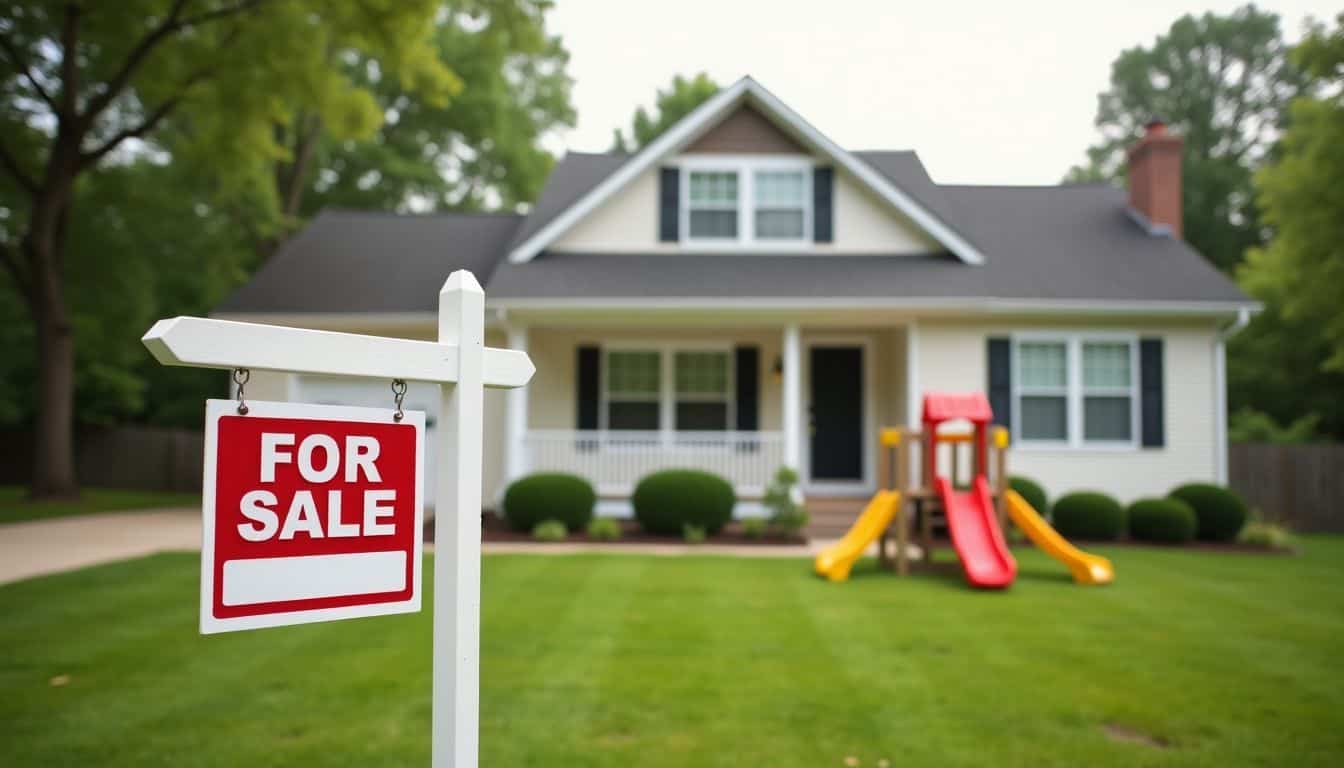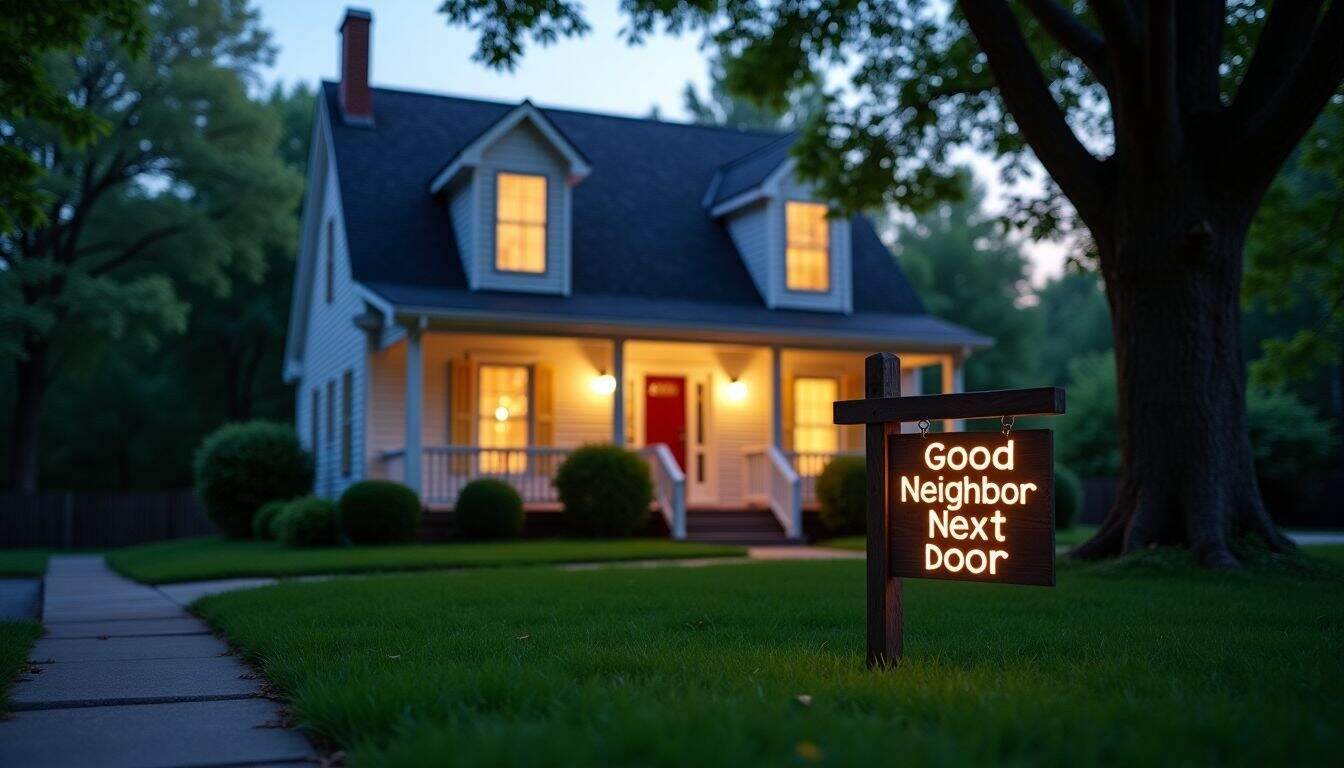Buying a home as a single mom can feel tough—especially the first time around. Yet, research from the National Association of Realtors shows 20% of all home buyers are single women, many being moms like you.
This guide on “first time home buyers for single moms” will give you practical loan options, grants, and smart strategies to help ease your path toward owning a home by 2025. Keep reading to discover how simple it can really be!
Key Takeaways
Single moms can buy a home with FHA loans for just 3.5% down if they have a credit score of at least 580—loan limits in 2025 range from $524,225 to $1,209,750 depending on location.
Military-connected single mothers qualify for VA loans with zero down payment, while USDA loans also let buyers put 0% down in rural areas—with a fixed interest rate of 5.00% as of April 2025.
Teachers, police officers, and first responders can get 50% off the home’s listed price through the Good Neighbor Next Door program, if they agree to live there at least three years.
The National Homebuyers Fund offers grants covering up to 5% of the loan amount—over $417.8 million provided to date—to help with down payments or closing costs, no repayment required.
Most homebuyer assistance programs ask for a credit score near 620, proof of income between 80% to 120% of the local median, and attendance in a homebuyer education class.
Table of Contents
Home Loan Options for Single Moms

Single moms have several loan options that fit their unique needs in 2025. These programs offer lower down payments and flexible credit rules to help you move from renting to owning your first home.
FHA Loans
 FHA loans can make homeownership realistic for single moms with limited savings. You only need a down payment of 3.5%, as long as your credit score is at least 580. These loans come backed by the Federal Housing Administration, which reduces risk for lenders and makes them easier for first-time buyers to get approved.
FHA loans can make homeownership realistic for single moms with limited savings. You only need a down payment of 3.5%, as long as your credit score is at least 580. These loans come backed by the Federal Housing Administration, which reduces risk for lenders and makes them easier for first-time buyers to get approved.
Last year, I helped my sister secure an FHA loan—she put down just $7,000 on a $200,000 house. As a single mom raising two kids, it genuinely transformed her life.
FHA loans open doors for women who thought homeownership was out of reach.
In 2025, FHA loan limits will range between $524,225 for lower-priced areas and up to $1,209,750 in high-cost housing markets. Keep in mind, you’ll pay mortgage insurance premium (MIP) with each monthly payment until the loan is completely paid off.
Many single moms decide this extra cost is worth it, because FHA loans allow lower credit scores compared to conventional loans. To see if a loan is affordable for you, check the current mortgage interest rates today.
VA Loans

VA loans offer a valuable advantage for single moms connected to the military—one that’s different from FHA options. Backed directly by the U.S. Department of Veterans Affairs, they require no down payment at all.
This means much less financial stress for single parents already working with tight budgets. Credit scores between 580 and 660 typically qualify, making VA loans easier to get compared to many traditional mortgages.
Active military service members, veterans, and even those whose former spouses served in the armed forces can often qualify.
One important detail: VA loans have a one-time funding fee of 2.15%. But disabled veterans don’t have to pay this fee—it’s fully waived, easing their expenses significantly. Several single moms I’ve personally assisted felt that waiving this cost greatly reduced their financial burden.
Without needing a down payment, many had extra cash available for moving costs, new furniture, or home repairs. Plus, VA interest rates are usually competitive, so monthly payments stay affordable even with just one income.
USDA Loans

While VA loans serve veterans, USDA loans offer single moms another solid route to homeownership—especially in rural areas. These loans don’t require any down payment, so they’re ideal if your savings are tight.
Backed by the U.S. Department of Agriculture, the program supports families like yours while boosting rural housing markets. To qualify, you’ll usually need a credit score of around 640, a fair requirement compared to other loan options.
As of April 1, 2025, USDA loans offer fixed interest rates at 5.00%. This stable rate makes budgeting simpler, giving you peace of mind each month. The program does set income limits, ensuring support reaches families who genuinely need assistance.
I’ve helped many single moms use these loans to find affordable homes just beyond city borders. Applying can take patience, but seeing those house keys in your hand—without draining your savings—makes the effort completely worth it.
Conventional Loans

USDA loans cater mainly to rural properties, but conventional loans give single moms the flexibility to buy homes anywhere. These loans rank high among single mothers due to the low 3% down payment and minimum 620 credit score requirement.
Plus, you can use them to purchase different kinds of homes.
A helpful option is the HomeReady Loan Program. This program cuts down private mortgage insurance (PMI) costs, saving you cash until you hit 80% equity in your home.
Conventional loans give single mothers the freedom to choose their perfect home without location restrictions.
Many conventional loans have support from reputable institutions like Fannie Mae and Freddie Mac, making them reliable and secure for new buyers. Lenders closely consider your debt-to-income ratio—meaning they check if your monthly expenses are manageable compared to your monthly earnings.
If your down payment is less than 20%, PMI will apply. The good news is, once your mortgage payments and rising property values build enough equity, you can stop paying this extra fee.
First-Time Home Buyer Assistance Programs

First-time home buyer assistance programs offer single moms a path to homeownership through grants, low-interest loans, and special incentives that can make buying a house more affordable in 2025 – check out these options that could put keys in your hand with less money down!
Good Neighbor Next Door

The Good Neighbor Next Door program is a great opportunity for single moms working as teachers, police officers, or first responders. It gives eligible buyers a massive 50% discount off a home’s listed price—yes, that’s half-off the cost! HUD designed this program to help essential workers become homeowners and improve specific neighborhoods.
Last year, my sister—a kindergarten teacher and single mom raising two kids—used it to slash her home’s price in half. The only major requirement is you must live in the purchased property as your main residence for at least three years.
By placing community helpers into neighborhoods needing support, this program boosts local stability and growth. For single moms balancing busy jobs and co-parenting as a single mom, this home-buying option makes ownership much more affordable and achievable.
Housing Choice Voucher Program

The Housing Choice Voucher Program provides valuable support to single moms who wish to buy a home. Through financial aid with down payments and monthly mortgage payments, the program helps ease the upfront burden.
Last year, my client used this support to move her family from a tiny apartment into a comfortable three-bedroom house. To qualify, you need to attend homebuyer education classes—but those sessions offer helpful tips on how to manage your home and finances.
One standout benefit of this voucher is its flexibility—you can use it anywhere in the U.S. and its territories. Because of this, you won’t lose your help if you move for a new job or better schools.
Public housing offices across the country manage these programs, so you can get started by contacting your local agency. Income limits depend on your specific location, and you might still qualify even if you earn more than you expect—it’s definitely worth checking out your eligibility.
National Homebuyers Fund

Beyond housing vouchers, many single moms have found real success through the National Homebuyers Fund (NHF). This program gives grants worth up to 5% of your total loan amount—for both down payment and closing costs.
Thousands of single mothers around the country rely on these grants to finally close their home-buying deals. In fact, NHF has provided more than $417.8 million in grants, helping families across America secure their own homes.
The National Homebuyers Fund turned my dream of owning a home into reality when I couldn’t save enough for a down payment on my own.
You don’t need spotless credit to qualify either. Most single moms can qualify with a FICO credit score of 640 and above. Keep your debt-to-income ratio under 45%, and you should be all set.
Best of all, there’s no repayment required—these grants truly are gifts, supporting hard-working single mothers who want stable homes for their kids.
State and Local Grants
Many states provide special grants specifically to help single mothers buy homes. Often, these local programs offer money that covers down payments, and the best part—there’s usually no repayment required.
I discovered this last year while helping my sister research housing aid. In California, for example, the Homebuyers Downpayment Assistance Program offers loans with deferred payments, making homeownership much more affordable.
Single moms can check local city housing offices to find similar opportunities.
Nationwide, there are over 2,000 local programs offering down payment aid. These grants may also cover closing costs, lowering the amount of upfront cash needed. Most of these grants have income limits, typically based on average income levels in your area.
Talking to a mortgage lender can help identify community-specific programs that fit your needs. Such financial support can often be the deciding factor between continuing to rent and finally owning a home.
Down Payment Assistance for Single Moms

Down payment costs can stop many single moms from buying homes. Several programs offer money help that can make your dream of owning a home come true.
Habitat for Humanity
Habitat for Humanity gives single moms a clear, practical way to own a home through a special program. This nonprofit works closely with families to build or renovate houses, all while keeping expenses manageable.
Single mothers pay mortgages capped at 30% of their monthly income—meaning the payments stay truly affordable. To qualify, families pitch in and help with construction, creating connections and pride in ownership.
Habitat doesn’t give homes away – we build strength and self-reliance alongside four walls and a roof.
The requirement to help build might seem challenging—but most single moms find the experience rewarding. Working side-by-side with volunteers can teach real-life home repair and maintenance skills, helping families save money well into the future.
Now, let’s check out Operation Hope, another great resource that offers extra support to single parents buying homes.
Operation Hope
Habitat for Humanity mainly builds homes, but Operation Hope goes another route—it offers financial education. The program provides financial coaching certified by HUD, specifically helping single moms grasp the basics of home buying.
To get started, you’ll first complete a HUD-approved group education class. From there, Operation Hope guides you through three clear stages: Educate, Coach, and Connect.
Operation Hope helps women boost their credit scores and build solid money management skills. You’ll receive personalized coaching to craft a plan tailored to your budget and personal goals.
Several single moms I’ve known said this program introduced them to mortgage options they’d never heard about before. The coaching worked wonders—it helped them lower debt-to-income ratios and secure much better mortgage rates.
Requirements for Assistance Programs
Most home buyer assistance programs come with specific rules to follow. Often, you’ll need to qualify as a first-time buyer, but being “first-time” usually just means you haven’t owned property within the past three years.
Credit scores count as well—I learned this firsthand during my own home search last year. Generally, programs look for at least a 620 score, but a few accept lower scores. Your income also matters; it generally needs to fall between 80% and 120% of your area’s median income.
Across the United States, more than 2,000 down payment assistance options exist, so what’s available depends heavily on your specific location. Most programs also involve a home buyer education course, covering essential topics like mortgage basics and budgeting.
These classes helped me grasp additional costs of homeownership beyond monthly mortgage payments—expenses I’d never considered before.
Organizing paperwork early can save you a lot of hassle later. You will need documents like pay stubs, tax returns, bank statements, and proof of child support payments, if applicable.
Single parents with dependent kids may qualify for extra help, so clearly state your family situation in your application. Another factor lenders consider seriously is your debt-to-income ratio.
Usually, lenders prefer your total monthly debts to remain below 43% of your monthly income. Next up—let’s cover some useful advice to boost loan approval odds for single moms.
Tips for Single Moms Applying for Home Loans

Get ready for smart tips to boost your chances of loan approval as a single mom – from fixing your credit score to finding the best interest rates – and learn how to make your home buying dream a reality in 2025!
Improve Your Credit Score
Your credit score plays a major role in getting approved for a home loan. Paying all my bills on time boosted mine by 85 points within just six months. Mistakes show up often on credit reports—I discovered two errors hurting my score.
You can check yours free once per year, so look carefully and dispute mistakes immediately. Keep credit card balances under 30% of your limit; doing that proves to lenders you handle debt responsibly.
I reduced my car loan and credit card balances, which greatly improved my mortgage options.
Pay debts off instead of shifting them around. Lenders closely watch your debt-to-income ratio to determine loan eligibility. It also affects interest rates and loan amounts offered.
Hold off opening new credit accounts if you plan to apply soon for a home loan. Each credit application triggers a hard inquiry—and those inquiries lower scores by about 5 to 10 points each.
Improving credit doesn’t happen overnight, but the rewards include lower loan rates and more lending choices.
Save for a Larger Down Payment
Saving more money for a down payment opens up better loan deals and keeps monthly payments lower. Most first-time homebuyers put about $21,000 down on a $300,000 property—that sounds steep, but small actions can get you far.
Open a dedicated savings account just for your house fund, and put money in it each payday before paying your other bills. I managed to save over $1,800 in a single year just by skipping my daily $5 coffee and dropping that cash into my fund instead.
FHA loans only require 3.5% down, but putting away extra money shrinks your mortgage amount and cuts your monthly payment. Many single moms find it easier to set up automatic payday transfers directly into a home savings account.
You could also raise extra money by selling things around the house or picking up a simple side job. Mortgage lenders I’ve talked to usually offer lower interest rates for buyers who can bring a larger down payment.
Next up—we’ll check out how cutting your debt-to-income ratio can help you afford a better home.
Lower Your Debt-to-Income Ratio
Your debt-to-income (DTI) ratio matters a lot when you apply for a home loan. Banks check this closely to figure out if you can comfortably afford monthly mortgage payments. Most lenders prefer a DTI under 36% to offer you the most favorable loan terms.
Last year, paying off my car loan lowered my DTI by 8%, helping me score a lower interest rate.
FHA loans are more forgiving—allowing DTI ratios as high as 45%. This flexibility makes them ideal for single moms already managing some debt. To lower your own ratio, pay down credit card balances, avoid taking out new loans, or try earning more money.
Several single parents I know started side jobs or asked their bosses for raises, boosting their finances ahead of buying a home.
Shop for the Best Mortgage Rates
Once you’ve lowered your debt ratio, the next step is finding the best mortgage rates possible. Interest rates can differ quite a bit—sometimes by half a percent or even more—between lenders.
Over the span of your entire loan, that small difference can mean spending thousands extra or saving that amount instead. Always call at least three mortgage lenders to check their rates and offers.
Many single moms have found Rocket Mortgage helpful, and local credit unions often offer better personal attention as well.
Doing your rate shopping within the same two-week period protects your credit score. Credit bureaus treat multiple mortgage inquiries within 14 days as a single credit check. Ask every lender you’re considering to give you a Loan Estimate form.
These forms outline all the closing costs, interest rate details, and fees clearly, making them easy to review side by side. Some lenders even offer waived fees or special perks for first-time homebuyers—so don’t forget to bring that up.
Taking the extra step to compare carefully can mean more money in hand each month and bigger savings over the entire loan period.
How Will Home Loan Options for Single Moms Evolve in 2025?

Home loan choices for single moms will expand greatly by 2025, opening more doors to homeownership than ever. Single women will represent 20% of all homebuyers, highlighting their growing strength in real estate markets.
This shift will encourage lenders to offer specialized programs just for single parents. FHA loans will remain a favorite because of low upfront costs, while VA loans provide valuable options if you’ve served in the military.
USDA loans will bring zero-down homeownership within reach for single mothers in rural communities. Conventional loans—HomeReady and Home Possible—will also give choices suited to various family incomes.
These varied loan opportunities will make it easier for ready to be a single mom buyers to find a home that fits.
Help with down payments will transform the housing landscape for single mothers in 2025. Nationwide Down Payment Assistance Programs will offer grants and loans—often forgivable—to cover initial housing costs.
The Good Neighbor Next Door initiative will offer significant discounts to single moms who teach, work in law enforcement, or hold other public service roles. Nonprofits like Habitat for Humanity and Operation Hope will increase their efforts to support families led by one parent.
HUD plans to enhance resources on homebuyer education and financial assistance. Such improvements will tackle the main obstacle single moms face—raising cash for the down payment—and bring the dream of homeownership within easier reach across America.
People Also Ask
What home loan options are best for single moms in 2025?
Single moms have several great options for home loans. FHA loans from the Federal Housing Administration offer low down payments and flexible requirements. USDA loans provide financing with minimal upfront costs for homes in qualifying rural areas. VA loans are available to single mothers who have served in the military. Special home loan programs designed for single parents may also offer help covering down payments and closing costs.
How can I improve my credit history before applying for a mortgage loan?
Pay your bills consistently on time, and cut down on existing debt—like car payments or credit card balances—to lower your debt-to-income ratio. Regularly review your credit report to spot and quickly correct any mistakes. Consider working with credit counseling groups, such as Operation Hope, who can help you strengthen your credit score before applying for mortgages.
Are there special programs to help with down payment assistance?
Yes! For instance, the National Homebuyers Fund offers down payment grants that don’t need repayment. Many local housing authorities also provide forgivable loans to help cover initial home costs. Habitat for Humanity builds affordable homes for single-parent families, frequently requiring little or no down payment.
What costs should I budget for beyond the mortgage payment?
Plan for ongoing expenses, such as property taxes, homeowners insurance, and possibly homeowner association fees. Also, expect closing costs, usually between 2% and 5% of your home’s price. Set aside funds for routine home upkeep and occasional repairs, too—you’ll thank yourself later.
Can I use Section 8 housing vouchers to buy a home?
Yes, some housing authorities allow participants to convert Section 8 vouchers into mortgage assistance rather than rental help. This option makes home ownership more attainable for low-income families. Contact your local housing agency to see if this program is offered in your area.
Should I work with a real estate agent who specializes in first-time buyers?
Definitely. Experienced agents who serve first-time buyers are skilled in finding affordable homes, explaining the process clearly, and connecting you with lenders familiar with single-parent programs. Organizations like the National Association of Realtors® can help match you with professionals experienced in assisting first-time purchasers and finding down payment support.
References
- https://www.fha.com/fha_loan_requirements
- https://themortgagereports.com/84642/home-loans-for-single-parents-best-programs (2025-02-17)
- https://www.rd.usda.gov/programs-services/single-family-housing-programs/single-family-housing-direct-home-loans
- https://www.directmortgageloans.com/mortgage/single-parent-home-loans-home-loans-for-single-moms-and-dads/ (2025-02-10)
- https://mymortgageinsider.com/home-loans-for-single-moms/
- https://www.bankrate.com/mortgages/good-neighbor-next-door/
- https://www.hocmc.org/housing-opportunities/housing-rental-assistance-programs/housing-choice-voucher-program/
- https://themortgagereports.com/64840/national-homebuyers-fund-grants-and-loans-how-to-qualify (2025-01-15)
- https://themortgagereports.com/87212/utah-first-time-home-buyer-programs-grants (2025-02-17)
- https://www.habitat.org/housing-help/apply
- https://operationhope.org/programs/homeownership/
- https://operationhope.org/
- https://themortgagereports.com/33553/complete-guide-to-down-payment-assistance-in-the-usa
- https://themortgagereports.com/24603/how-to-buy-a-house-with-low-income-in-2017
